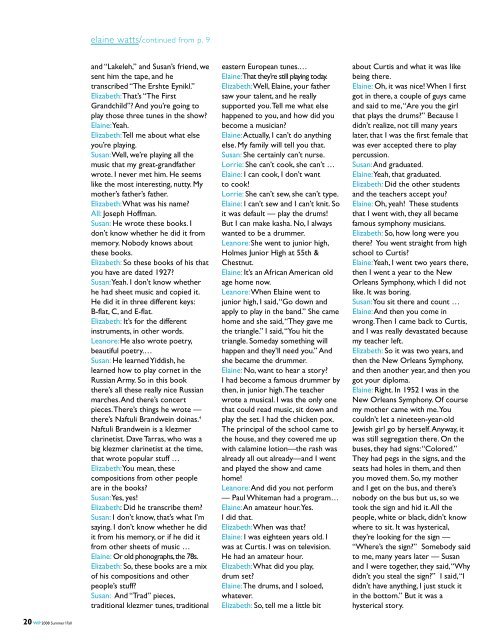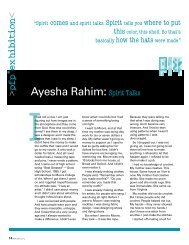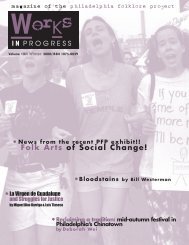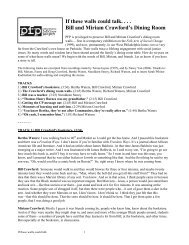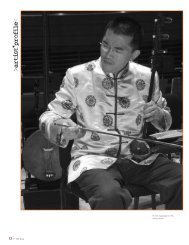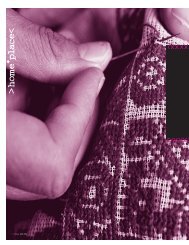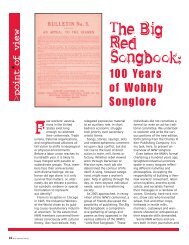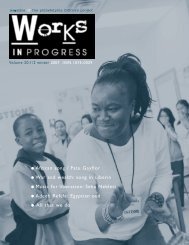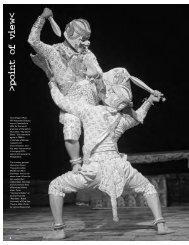View PDF - Philadelphia Folklore Project
View PDF - Philadelphia Folklore Project
View PDF - Philadelphia Folklore Project
You also want an ePaper? Increase the reach of your titles
YUMPU automatically turns print PDFs into web optimized ePapers that Google loves.
elaine watts/continued from p. 9<br />
and “Lakeleh,” and Susan’s friend, we<br />
sent him the tape, and he<br />
transcribed “The Ershte Eynikl.”<br />
Elizabeth: That’s “The First<br />
Grandchild” And you’re going to<br />
play those three tunes in the show<br />
Elaine:Yeah.<br />
Elizabeth: Tell me about what else<br />
you’re playing.<br />
Susan:Well, we’re playing all the<br />
music that my great-grandfather<br />
wrote. I never met him. He seems<br />
like the most interesting, nutty. My<br />
mother’s father’s father.<br />
Elizabeth: What was his name<br />
All: Joseph Hoffman.<br />
Susan: He wrote these books. I<br />
don’t know whether he did it from<br />
memory. Nobody knows about<br />
these books.<br />
Elizabeth: So these books of his that<br />
you have are dated 1927<br />
Susan:Yeah. I don’t know whether<br />
he had sheet music and copied it.<br />
He did it in three different keys:<br />
B-flat, C, and E-flat.<br />
Elizabeth: It’s for the different<br />
instruments, in other words.<br />
Leanore:He also wrote poetry,<br />
beautiful poetry.…<br />
Susan: He learned Yiddish, he<br />
learned how to play cornet in the<br />
Russian Army. So in this book<br />
there’s all these really nice Russian<br />
marches. And there’s concert<br />
pieces. There’s things he wrote —<br />
there’s Naftuli Brandwein doinas. 4<br />
Naftuli Brandwein is a klezmer<br />
clarinetist. Dave Tarras, who was a<br />
big klezmer clarinetist at the time,<br />
that wrote popular stuff …<br />
Elizabeth: You mean, these<br />
compositions from other people<br />
are in the books<br />
Susan: Yes, yes!<br />
Elizabeth: Did he transcribe them<br />
Susan: I don’t know, that’s what I’m<br />
saying. I don’t know whether he did<br />
it from his memory, or if he did it<br />
from other sheets of music …<br />
Elaine: Or old phonographs, the 78s.<br />
Elizabeth: So, these books are a mix<br />
of his compositions and other<br />
people’s stuff<br />
Susan: And “Trad” pieces,<br />
traditional klezmer tunes, traditional<br />
eastern European tunes.…<br />
Elaine:That they’re still playing today.<br />
Elizabeth: Well, Elaine, your father<br />
saw your talent, and he really<br />
supported you. Tell me what else<br />
happened to you, and how did you<br />
become a musician<br />
Elaine:Actually, I can’t do anything<br />
else. My family will tell you that.<br />
Susan: She certainly can’t nurse.<br />
Lorrie: She can’t cook, she can’t …<br />
Elaine: I can cook, I don’t want<br />
to cook!<br />
Lorrie: She can’t sew, she can’t type.<br />
Elaine: I can’t sew and I can’t knit. So<br />
it was default — play the drums!<br />
But I can make kasha. No, I always<br />
wanted to be a drummer.<br />
Leanore:She went to junior high,<br />
Holmes Junior High at 55th &<br />
Chestnut.<br />
Elaine: It’s an African American old<br />
age home now.<br />
Leanore:When Elaine went to<br />
junior high, I said, “Go down and<br />
apply to play in the band.” She came<br />
home and she said, “They gave me<br />
the triangle.” I said, “You hit the<br />
triangle. Someday something will<br />
happen and they’ll need you.” And<br />
she became the drummer.<br />
Elaine: No, want to hear a story<br />
I had become a famous drummer by<br />
then, in junior high. The teacher<br />
wrote a musical. I was the only one<br />
that could read music, sit down and<br />
play the set. I had the chicken pox.<br />
The principal of the school came to<br />
the house, and they covered me up<br />
with calamine lotion—the rash was<br />
already all out already—and I went<br />
and played the show and came<br />
home!<br />
Leanore:And did you not perform<br />
— Paul Whiteman had a program…<br />
Elaine:An amateur hour. Yes.<br />
I did that.<br />
Elizabeth: When was that<br />
Elaine: I was eighteen years old. I<br />
was at Curtis. I was on television.<br />
He had an amateur hour.<br />
Elizabeth:What did you play,<br />
drum set<br />
Elaine:The drums, and I soloed,<br />
whatever.<br />
Elizabeth: So, tell me a little bit<br />
about Curtis and what it was like<br />
being there.<br />
Elaine: Oh, it was nice! When I first<br />
got in there, a couple of guys came<br />
and said to me, “Are you the girl<br />
that plays the drums” Because I<br />
didn’t realize, not till many years<br />
later, that I was the first female that<br />
was ever accepted there to play<br />
percussion.<br />
Susan:And graduated.<br />
Elaine:Yeah, that graduated.<br />
Elizabeth: Did the other students<br />
and the teachers accept you<br />
Elaine: Oh, yeah! These students<br />
that I went with, they all became<br />
famous symphony musicians.<br />
Elizabeth: So, how long were you<br />
there You went straight from high<br />
school to Curtis<br />
Elaine: Yeah, I went two years there,<br />
then I went a year to the New<br />
Orleans Symphony, which I did not<br />
like. It was boring.<br />
Susan: You sit there and count …<br />
Elaine:And then you come in<br />
wrong. Then I came back to Curtis,<br />
and I was really devastated because<br />
my teacher left.<br />
Elizabeth: So it was two years, and<br />
then the New Orleans Symphony,<br />
and then another year, and then you<br />
got your diploma.<br />
Elaine: Right. In 1952 I was in the<br />
New Orleans Symphony. Of course<br />
my mother came with me. You<br />
couldn’t let a nineteen-year-old<br />
Jewish girl go by herself. Anyway, it<br />
was still segregation there. On the<br />
buses, they had signs: “Colored.”<br />
They had pegs in the signs, and the<br />
seats had holes in them, and then<br />
you moved them. So, my mother<br />
and I get on the bus, and there’s<br />
nobody on the bus but us, so we<br />
took the sign and hid it. All the<br />
people, white or black, didn’t know<br />
where to sit. It was hysterical,<br />
they’re looking for the sign —<br />
“Where’s the sign” Somebody said<br />
to me, many years later — Susan<br />
and I were together, they said, “Why<br />
didn’t you steal the sign” I said, “I<br />
didn’t have anything, I just stuck it<br />
in the bottom.” But it was a<br />
hysterical story.<br />
20 WIP 2008 Summer / Fall


